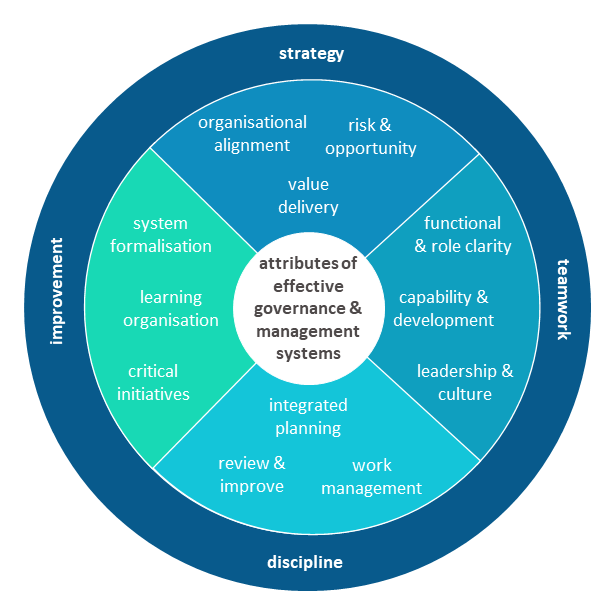What is governance?
Governance is the system by which a business (or any organisation) is directed and controlled. It defines the structure and processes through which decisions are made and actions taken to achieve the business objectives. It is the foundational element of any integrated management system as it provides the structure and oversight to ensure the delivery of the business strategy. Governance sets the rules, processes, practices, and objectives that the rest of the business must follow and deliver. Governance occurs at all levels of the business and is not limited to corporate governance; although this is perhaps the most well know.
What is the value of governance?
There is no shortage of high-profile corporate scandals that have had a material impact on business performance. This is to the point that many of these businesses no longer exist or their reputations have been tarnished and consumer trust eroded. Some well-known examples include Enron, Volkswagen (Dieselgate), Lehman Brothers, Theranos, Facebook (user privacy); the list goes on and on. All of these can be considered – in one way or another – a governance failing. With an ever-increasing focus on governance to provide greater transparency on overall business performance – especially regarding social license to operate requirements – there is an even greater need for effective and efficient governance to meet stakeholder requirements.
What is the objective of governance?
Governance has four key objectives:
- To resolve conflicts between the key stakeholders (governments, communities, shareholders, and leadership teams) and set a clear direction for the business.
- To control the implementation of the business strategy, managing risks and leverage opportunities, and ensuring decision-making accountabilities are assigned at the right level of the business.
- To assess performance across the business and ensure ongoing continuous improvement by transparently reporting current state compliance and progress to improvement to all key stakeholders.
- To ensure a culture of accountability, transparency, and ethical behaviour across the business.
What makes governance effective?
For a governance framework to be effective it must at a minimum address the key attributes shown in the following diagram. These areas are a subset of the overall integrated management system that prescribes the requirements for other production and support business functions (the “routine” management of the business). The governance requirements – aligned to fundamentals articulated in ISO 9001 – apply across the entire business whereas production and support function requirements may be functional area-specific in nature.

Governance must “close the loop”
Governance must, above all, ensure that we have “closed the loop” on our management system continuous improvement cycle such that improvements are identified, implemented, and sustained. Essential to driving this improvement is the ability to assess performance across the business, and transparently report current state compliance and progress to improvement.
Assessing performance is not simply verifying the outcomes of the business. Governance must check “under the hood” of the business to confirm that there is compliance with the approved policies and frameworks. Auditing and assessing the compliance, identifying opportunities for improvement, and tracking these improvements to completion is how we increase business maturity and deliver improved outcomes now and into the future. Performance metrics are lagging – we must look deeper than these to address issues before they surface.
Effective governance must mitigate risk but not at the expense of opportunity
Without effective governance, businesses and their stakeholders are exposed to risks that could otherwise be mitigated. In some cases – as we saw earlier – the consequence of these risks is failure of the entire business. For governance to be effective, an effective and efficient mechanism to assess performance across the business, and transparently report current state compliance and progress to improvement to the approved policies and frameworks is an essential facet of “closing the loop”. Then and only then can we deliver increasing business management maturity and performance outcomes across all areas. However, governance must not be solely risk focused to the detriment of opportunity and innovation lest this in itself introduce a risk of failure through an inability to transform with the prevailing conditions.
Next in our series we will be discussing how standards are an essential part of effective governance. Until then, be Prediktable!
def: Prediktable; a state of management Zen where all our routine (boring) tasks are automated and we spend more time innovating, strategizing, engaging our teams, and delivering predictably great outcomes.
